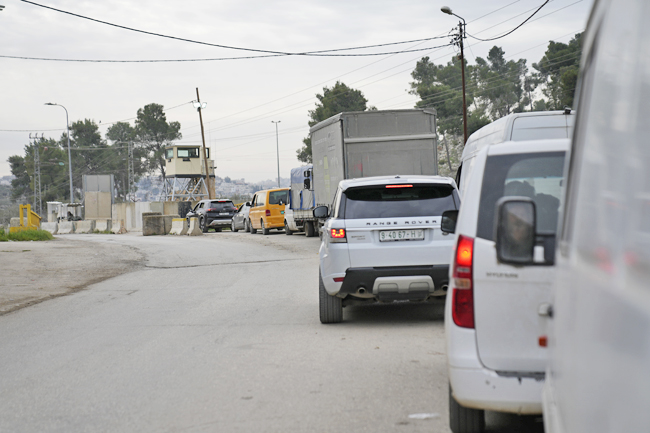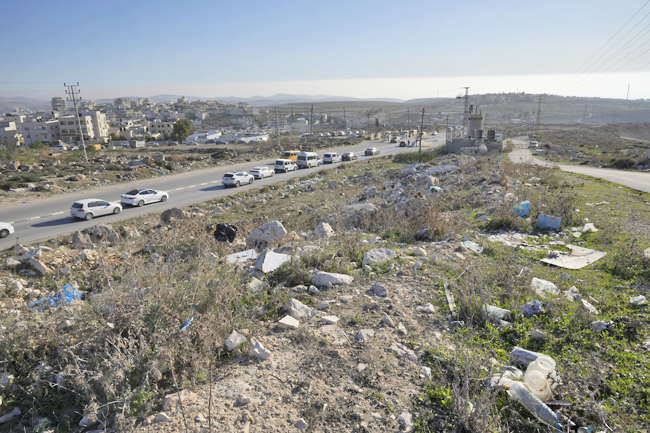RAMALLAH (AP) – Abdullah Fauzi, a banker from the northern West Bank city of Nablus, leaves home at 4am to reach his job by 8, and he’s often late.
His commute used to take an hour – until the attack on October 7, 2023 happened, after which Israel launched its offensive in the Gaza Strip.
The Israeli military also ramped up raids against Palestinian militants in the northern West Bank, and diverted its residents through seven new checkpoints, doubling Fauzi’s time on the road.
Now it’s gotten worse.
Since the ceasefire in Gaza between Israel and Hamas took effect, Fauzi’s drive to the West Bank’s business and administrative hub, Ramallah, has become a convoluted, at least four-hour wiggle through steep lanes and farm roads as Israel further tightens the noose around Palestinian cities.


“You can fly to Paris while we’re not reaching our homes,” the 42-year-old said from the Atara checkpoint outside Ramallah last week, as Israeli soldiers searched scores of cars, one by one.
“Whatever this is, they’ve planned it well,” he said. “It’s well-designed to make our life miserable.”
A CEASEFIRE BEGETS VIOLENCE
As the truce between Israel and Hamas took hold on January 19, radical Israeli settlers – incensed over an apparent end to the war and the release of Palestinian prisoners in exchange for Israeli hostages – rampaged through West Bank towns, torching cars and homes.
Two days later, Israeli forces with drones and attack helicopters descended on the northern West Bank city of Jenin.
More checkpoints started going up between Palestinian cities, slicing up the occupied West Bank and creating choke points the Israeli army can shut off on a whim. Crossings that had been open 24/7 started closing during morning and evening rush hours, upturning the lives of hundreds of thousands of people.
New barriers – earthen mounds, iron gates – multiplied, pushing Palestinian cars off well-paved roads and onto rutted paths through open fields. What was once a soldier’s glance and head tilt became international border-like inspections.
Israel said the measures are to prevent Hamas from opening a new front in the West Bank. But many experts suspect the crackdown has more to do with assuaging settler leaders like Bezalel Smotrich, the finance minister and an important ally of Prime Minister Benjamin Netanyahu, who has threatened to topple the government if Israel does not restart the war in Gaza.
“Israel now has a free hand to pursue what it has wanted to in the West Bank for a long time: settlement expansion, annexation,” said senior analyst at the International Crisis Group Tahani Mustafa. “It was considered a potential trade-off.”
Asked why Israel launched the crackdown during the ceasefire, the Israeli military said politicians gave the order in part over concerns that the release of Palestinian prisoners – in swaps for Israeli hostages held by Hamas – could raise tensions in the West Bank.
LIFE DISRUPTED
To spend rush hour at an Israeli checkpoint is to hear of the problems it has brought – Palestinian families divided, money lost, trade disrupted, sick people kept from doctors.
Ahmed Jibril said not even his position as manager of emergency services for the Palestinian Red Crescent protects him.
“We’re treated like any other private car,” he said, describing dozens of cases in which Israeli soldiers forced ambulances to wait for inspection when they were responding to emergency calls.
In one case, on January 21, the Palestinian Health Ministry reported that a 46-year-old woman who had suffered a heart attack in the southern city of Hebron died while waiting to cross a checkpoint.
The United Nations (UN) humanitarian agency, or OCHA, reported that, as of last November 28, Israel had 793 checkpoints and roadblocks in the West Bank, 228 more than before the war in Gaza.
The agency hasn’t updated the tally since the ceasefire, but its latest report noted a surge in “suffocating restrictions” that are “tearing communities apart and largely paralysing daily life.”
A BUBBLE BURSTS
With its upscale restaurants and yoga studios, Ramallah gained a reputation in past conflicts for being something of a well-to-do bubble where cafe-hopping residents can feel immune to the harsh realities of the occupation.
Now its residents, struck in numbingly long lines to run simple errands, feel under siege.
“All we want to do is go home,” said Mary Elia, 70, stalled with her husband for nearly two hours at the Ein Senia checkpoint north of Ramallah last week, as they made their way home to east Jerusalem from their daughter’s house. “Are we meant to never see our grandchildren?”
A NATIONAL OBSESSION
Roll down the window at a bottlenecked checkpoint and the same soothing female voice can be heard emanating from countless car radios, reeling off every Israeli checkpoint, followed by salik – Arabic for open – or mughlaq, closed, based on the conditions of the moment.
These reports recently beat out weather broadcasts for top slot on the West Bank radio line-up.
Almost every Palestinian driver seems able to expound on the latest checkpoint operating hours, the minutiae of soldiers’ mood changes and fiercely defended opinions about the most efficient detours.
“I didn’t ask for a PhD in this,” said Yasin Fityani, 30, an engineer stuck in line to leave Ramallah for work, scrolling through new checkpoint-dedicated WhatsApp groups filled with footage of soldiers installing cement barriers and fistfights erupting over someone cutting the line.
LOST TIME, LOST MONEY
It was the second time in as many weeks that his boss at the Jerusalem bus company called off his morning shift because he was late.
Worse still for Nidal Al-Maghribi, 34, it was too dangerous to back out of the queue of frustrated motorists waiting to pass Jaba checkpoint, which severs his east Jerusalem neighbourhood from the rest of the city. Another full day’s work wasted in his car. “What am I supposed to tell my wife?” he asked, pausing to keep his composure. “This job is how I feed my kids.”
Palestinian trucks, packed with perishable food and construction materials, are not spared the scrutiny. Soldiers often ask truckers to pull over and unload their cargo for inspection. Fruit rots. Textiles and electronics get damaged.
The delays raise prices, further choking a Palestinian economy that shrank 28 per cent last year as a result of punitive Israeli policies imposed after Hamas’ attack, said Palestinian Economy Minister Mohammad Alamour. Israel’s ban on most Palestinian workers has left 30 per cent of the West Bank’s workforce jobless.
“These barriers do everything except their stated purpose of providing security,” Alamour said. “They pressure the Palestinian people and the Palestinian economy. They make people want to leave their country.” – Isabel Debre





